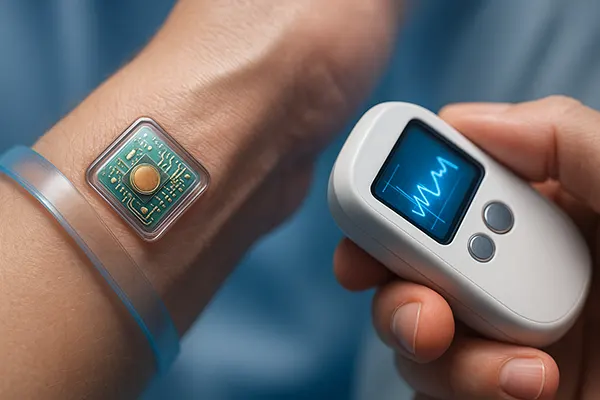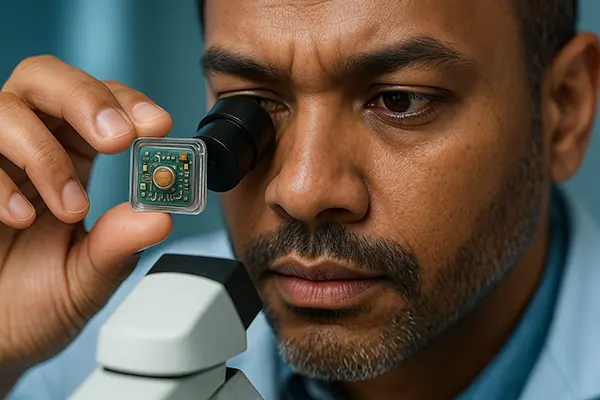
Biochips for Real-Time Health Monitoring
In 2025, biochips have become one of the most advanced tools in personalised medicine. These miniature devices are designed to continuously monitor human health, offering real-time data on vital parameters such as glucose levels, heart rate, hormonal balance, and even early signs of infection. Biochips are now transforming preventive healthcare, allowing people and doctors to react instantly to changes in the body’s condition.
The Principle of Biochip Functionality
Biochips are compact analytical devices that integrate biological sensors with electronic circuits. Their main purpose is to analyse biological samples, such as blood or sweat, and convert chemical reactions into digital signals. This process provides doctors and patients with immediate access to health data through smartphones or medical cloud systems.
In modern biochips, nanotechnology and microfluidics play a crucial role. They make it possible to detect molecular changes at an early stage, sometimes before symptoms appear. This precision opens new opportunities for early diagnosis of diseases like diabetes, cardiovascular conditions, or cancer.
Another important advantage is the ability of biochips to operate continuously. They can measure vital parameters every second and transfer information wirelessly to medical databases. This creates a constant connection between patient and doctor, making health management more proactive than ever.
Key Technologies Behind Biochips
Modern biochips rely on three core components: biosensors, microprocessors, and data interfaces. Biosensors are responsible for detecting chemical and biological markers in body fluids. Microprocessors interpret this data and transform it into readable information, while wireless interfaces transmit it to mobile devices or medical platforms.
One of the major innovations of 2025 is the introduction of graphene-based sensors. Graphene’s high conductivity allows biochips to detect even the smallest changes in electrical resistance caused by biochemical reactions. This ensures higher sensitivity and faster response time compared to older silicon-based designs.
Additionally, integration with artificial intelligence has become a standard. AI algorithms analyse the data collected by biochips, identifying patterns that may indicate health risks. This combination of hardware precision and software intelligence sets a new standard in digital healthcare.
Applications in Everyday Healthcare
The real-world applications of biochips have expanded beyond hospitals. Many people now use biochip-based wearables for daily health tracking, similar to smartwatches but far more accurate. These devices continuously monitor hydration, stress levels, and metabolic activity, helping individuals adjust their routines for optimal well-being.
In clinical settings, biochips are used for real-time monitoring of patients after surgery or during chronic disease management. Doctors can instantly detect any deviation from the norm and adjust treatment accordingly. This technology reduces hospital stays and increases recovery speed.
Pharmaceutical companies also use biochips in drug testing. By monitoring how a patient’s body reacts to medication in real-time, developers can optimise dosages and reduce the risk of adverse effects. This approach is transforming the way new drugs reach the market.
Benefits for Preventive Medicine
Preventive healthcare is one of the biggest beneficiaries of biochip innovation. Early detection of disease biomarkers allows medical professionals to intervene long before serious symptoms develop. This helps prevent complications and saves healthcare costs in the long term.
Furthermore, biochips allow for continuous collection of longitudinal health data. By analysing trends over months or years, doctors can better understand how lifestyle and environmental factors influence a person’s health. This leads to more precise and personalised medical recommendations.
Another key benefit is accessibility. With costs decreasing and production becoming more efficient, biochip-based devices are no longer limited to research institutions. They are now available for general consumers, contributing to a new era of personal health responsibility.

Ethical and Technological Challenges
Despite their advantages, biochips raise several ethical and technological concerns. The most discussed issue in 2025 is data privacy. Since biochips constantly transmit health data, ensuring secure encryption and protecting patient information is essential to prevent misuse.
Another challenge is the risk of data misinterpretation. While AI-driven analytics can detect anomalies, false positives remain possible. Medical professionals must still verify results to avoid unnecessary anxiety or inappropriate treatments.
From a technical perspective, ensuring the biocompatibility and durability of biochips remains a focus. Researchers are developing flexible materials that can adapt to body movements and function reliably under various physiological conditions.
The Future of Biochips in Medicine
Looking ahead, biochips are expected to integrate even deeper with neural and genetic monitoring systems. Future generations of devices may detect DNA mutations in real-time, opening the door to personalised genetic medicine and early cancer prevention.
Wireless power transmission and battery-free operation are also key research directions. These improvements will make biochips smaller, safer, and more comfortable for long-term use.
Ultimately, biochips represent a major step towards a world where healthcare is predictive rather than reactive. By turning the human body into a source of continuous data, they allow both individuals and doctors to maintain health with unprecedented precision and control.
